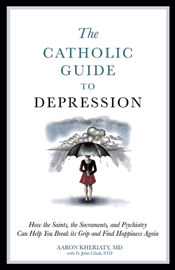Following is my column that appears in this week’s print edition of The Catholic Post. I invite your feedback here.
One of the perks of writing a monthly column is getting invited to speak occasionally to local groups about books and our Catholic faith.
(I “might” consider getting sometimes recognized at the post office as “that lady who writes about books,” but this is usually when I’m not looking my best, so no counting that. But I digress.)
Giving talks lets me hear from others about their favorite books, as well gives me valuable feedback about what’s popular or resonant here. Several recent encounters left me realizing that reviews touching on mental health issues have been much-needed and welcome.
So this month I’ll focus on several books–primarily one new book–in this area.
The Catholic Guide to Depression: How the Saints, the Sacraments and Psychiatry Can Help You Break Its Grip and Find Happiness Again by Aaron Kheriaty, MD, with Fr. John Cihak, STD is comprehensive, compassionate and Catholic. I highly recommended it.
The Catholic Guide to Depression is a sensible, well-thought-out book that covers a range of issues and concerns, from medication and lifestyle options; how psychological health can affect one’s spiritual life; therapy’s benefits and limits; and much, much more.
While excellent in every way, this book can seem a bit academic in some stretches, but interested readers should persist, as there is a wealth of powerful stories, strategies, and help offered in its pages.
I’ve written before about how certain topics are best handled by experts rather than those who consider themselves experts because they’ve read some church documents or read up on a particular issue or theological area. Surely mental health constitutes one such topic since there is so much conflicting information floating around in books, on the Internet, or even a tendency from some well-meaning Catholics to strictly “spiritualize” mental health issues.
In The Catholic Guide to Depression, author Dr. Kheriaty is an expert, being both a practicing Catholic and father to five, a psychiatrist and professor at University of California-Urvine, and co-chair in the school’s medical ethics program. He writes both compassionately and authoritatively here.
The end of the book includes a beautiful short section of “prayers in distress” from such saints as St. Benedict Joseph Labre, who suffered from mental illness throughout his life; and an address by Blessed John Paul II on the theme of depression. “
The Catholic Guide to Depression is new, but there are other resources that can be beneficial:
 *Surviving Depression: A Catholic Approach by Pauline Sister Kathryn J. Hermes, is a often-recommended book, and was reprinted and expanded last year. The most compelling aspect for readers is that Sister Kathryn herself has struggled off and on throughout her life with depression.
*Surviving Depression: A Catholic Approach by Pauline Sister Kathryn J. Hermes, is a often-recommended book, and was reprinted and expanded last year. The most compelling aspect for readers is that Sister Kathryn herself has struggled off and on throughout her life with depression.
As a result, she writes in a loving and knowing way about getting assistance and living out one’s Catholic faith when suffering. Surviving Depression also offers a separately available journal and prayer book.
*Fr. Benedict Groeschel’s Arise from Darkness: What to Do When Life Doesn’t Make Sense, is a classic work about suffering, grace and the life of faith. Fr. Groeschel writes not just from a spiritual perspective, but from one trained as a counselor, in a meditative and prayerful way about living with the reality of suffering and loss.
*For a much more personal story, consider Beyond Blue, Therese Borchard’s excellent memoir of her struggle with depression and mental health issues. I reviewed the book when it came out several years ago (and you can read that here), and as I shared, it’s well-written and at the same time often hard to read.
Borchard shares low points that include two hospitalizations, dozens of drug combinations, bad physicians, and suicide plans.
So why read this book? To quote Borchard, “anyone who struggles with anxiety or depression—even in the slightest way—might find a companion in me, some consolation in the incredibly personal details of my story, and a bit of hope to lighten an often dark and lonely path.” For those on “that dark and lonely path”, there is healing and hope.
It’s my sincere hope that one or more of these books can offer that to readers.

